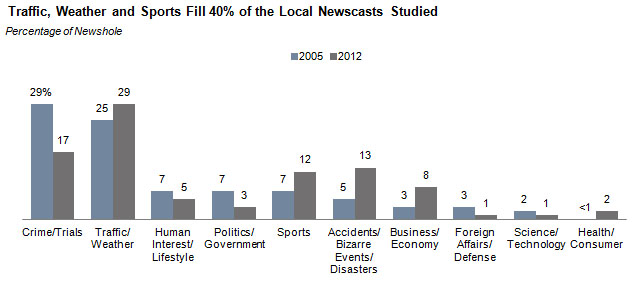Paul Waldman diverts my attention today to the 2013 edition of Pew’s “State of the Media” report. Pew says that local news is becoming ever more saturated by sports, weather, traffic and “bizarre events.” But the news isn’t all bad:
Crime stories have traditionally been among the largest component of local newscast, but in the two periods studied, there was a marked reduction. In 2005, crime accounted for a full 29% of the newshole. Five years later, that number had fallen to 17%.
As regular readers will immediately figure out, part of the reason for this is that there’s just less crime to report these days. What’s more, as overall crime rates drop, the TV viewing audience is less obsessed with it and less interested in the latest scary stories. So this is all good. But there’s also this:
The same basic trend was seen in coverage of politics and government. In 2005, those topics accounted for 7% of the airtime studied. By 2012/2013, that coverage had been more than halved—to 3% of the airtime. For some time, television consultants have been advising local television stations that viewers aren’t interested in politics and government, and it appears that advice is being taken.
Paul sort of half-heartedly looks for a silver lining here: “I suppose one could argue that what we have here is a salutary specialization. If you want to hear what’s going on in politics, you can turn to cable news, where you’ll get plenty of it, and you can turn to local news for traffic, sports, and weather.”
This would be okay if local newscasts were reducing their coverage of national politics. Cable news can indeed pick up the slack there. But they’re reducing their coverage of local politics, and increasingly so is everyone else. The Boston Phoenix closed up shop last week, part of a trend of community alt-weeklies shutting down. Local radio is mostly just chattering gasbags and syndicated blowhards. Metro dailies have all but abandoned local political coverage of the towns and suburbs that surround their urban core. Here in my neck of the woods, we discovered in 2010 that the city of Bell was enmeshed in a widespread corruption scandal, but since there were literally almost no reporters covering Bell, it went unnoticed for more than a decade.
Now, it’s not as if local TV news ever did a great job of covering local politics. But they did cover it, and so did a lot of other outlets. As all of them slowly but surely abandon it, local leaders remain under the scrutiny of a few activists and news junkies, but not much of anyone else. I don’t think anyone knows what to do about this, but it’s a problem.


















